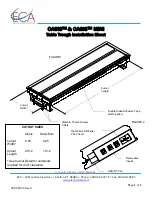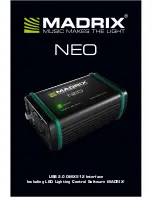
13
MICRO INSECTICIDE GRANULES IN PASTURES
In New Zealand where grass grub is a problem, excellent control has been attained
with the use of Gesapon, Dasanit, Dysiston, Mocap, and Lindane in control of this
pasture destroyer. Normal rates applied on the pasture surface can be as high as 30
kg/ha (26 lb/acre) but when sown in the soil and hence away from neutralizing effect
sunlight, rates as low as four and five kg/ha can be used. If unexposed to sunlight
these chemicals can remain effective in the soil as long as three months, thus killing
generations of pupae as they emerge. This factor is an important feature of the
Seedmatic.
Watch for slugs. Slugs like the moist groove produced by the wing blade opener. If
slugs become a problem (eating seeds or seedlings underground), a suitable pellet
should be used.
DIRECT SEEDING OF FEED CROPS AND ARABLE CROPS
WITH THE SEEDMATIC AND GRASSFARMER.
We are not in a position to give total formal recommended seeding rates, chemical
usage and fertiliser recommendations because of circumstance that the Seedmatic will
be used in will be so varied and diverse that some misunderstanding can occur.
Refer to the checklist and ALWAYS confirm with known successful CT operators as
well as your local seed specialist and chemical company representatives. Remember
that with this technique the environment is not as predictable as with cultivated soils,
and take the precaution of using insecticide or increased fertiliser if there should be
any element of doubt.
Seeding programs are wide and varied and it is best to look at rotation that starts with
a legume or feed crop followed by a grain crop, followed by another feed crop and so
on. Heavy pasture into grain can be disappointing, but grain after legume or brassica
is outstanding.
Here are just a few possibilities:
Brassicas, Turnips, Swedes, Legumes
– Can be sown spring (for winter feed) or
again in autumn for later winter early spring feed. The technique is to blanket spray
the entire area and ensure that seeding depths are shallow. A light bar harrow pulled
over the seeding areas is beneficial. Use fertiliser and see your chemical company
specialist with regard to the correct insecticide to use.
Winter Feed Oats
– This can be seeded direct into pasture in early autumn. Existing
Herbage control should be carried out.
Wheat and Barley
– Direct seeding in early spring or autumn depending on variety.
Always spray out pasture with approved herbicide (may not be necessary after
brassica). Always sow with fertiliser.
Lucerne, Alfalfa
– Sow in spring after spraying out entire area with Roundup or
similar herbicide. It is always a good idea to do a soil test to ensure that the solid pH
is satisfactory for plant establishment. Also it is necessary to ensure that the seeds are
treated with inoculants to guarantee their germination and nodulation. Apply fertiliser
and ensure that spraying and baiting for insects is carried out – particularly for control
of slugs and snails.
Green-feed Maize
– Carry out in spring and the same rules apply as with wheat,
barley and oats. You may wish to seed in 30 or 45 cm (12” or 18”) rows and the
technique for achieving that is shown under the section
SPECIAL PURPOSE
SEEDING
shown later in this booklet.
Summary of Contents for Aitchison Seedmatic 40 D Series
Page 2: ...1...
Page 13: ...12 SIMPLE RULES TO FOLLOW FOR SUCCESSFUL PASTURE RENOVATION...
Page 18: ...17...
Page 22: ...21...
Page 31: ...30...
Page 32: ...31...
Page 33: ...32 6...
Page 34: ...33...
Page 35: ...34...
Page 36: ...35...
Page 37: ...36...
Page 38: ...37...
Page 39: ...38...
Page 40: ...39...
Page 41: ...40...
Page 42: ...41...
Page 43: ...42...
Page 44: ...43...
Page 45: ...44...
Page 46: ...45...
Page 47: ...46...
Page 48: ...47...
Page 49: ...48...
Page 50: ...49...
Page 51: ...50...
Page 52: ...51...
Page 53: ...52...
Page 54: ...53...
Page 55: ...54...
Page 56: ...55...
Page 57: ...56...
Page 58: ...57...















































